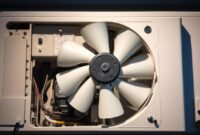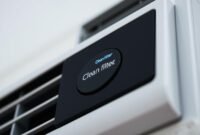Are you tired of your GE window AC blowing warm air? Many people face this issue with their ge air conditioner not cooling right. The temperature goes up, your room feels like an oven, and you wonder what’s wrong.
Fixing your GE window AC can seem hard, but most problems have easy fixes. I’ll show you how to find and fix the issue. You’ll learn simple DIY solutions and when to call a pro. This guide will help you get your AC working right again.
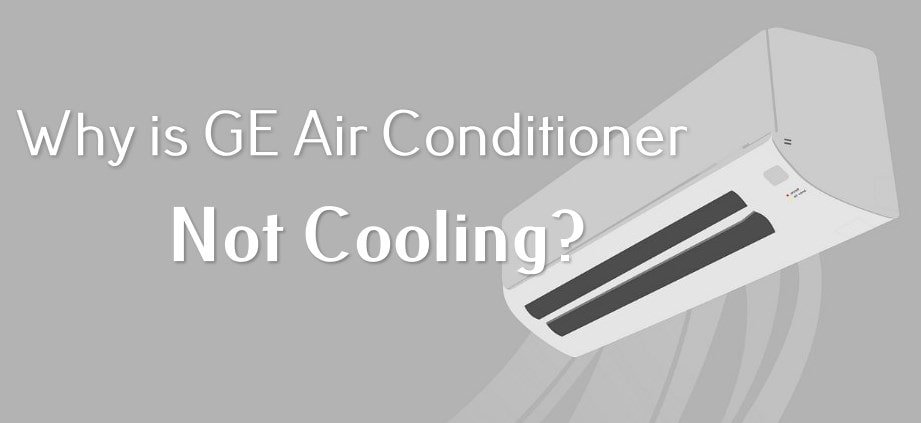
Common Causes of GE Air Conditioner Not Cooling
When your GE air conditioner isn’t cooling, several issues might be at play. Knowing these common problems can help you fix your ge air conditioner repair fast.
Improper Installation Challenges
Many homeowners face ge ac not blowing cold air due to bad installation. It’s key to install it right for best performance. Here are some installation mistakes to watch out for:
- Choosing the wrong unit size for your room
- Bad window seal connections
- Not enough air around the unit
- Mounting it unevenly, blocking airflow
Read also: Window Air Conditioner Turning On and Off Repeatedly
Blocked Airflow Complications
Blocked airflow can really cut down your air conditioner’s cooling power. Look out for these common blockages:
- Furniture blocking air vents
- Heavy curtains stopping air flow
- Dust and debris in air paths
- Closed interior doors blocking air
Temperature Setting Errors
Setting the wrong temperature can make your GE air conditioner seem like it’s not working. Double-check your thermostat and make sure it’s set for cooling. Some units need special settings to cool properly.
By knowing these common problems, you can fix your air conditioner. This way, you’ll enjoy cool comfort in your home all the time.
Understanding Your GE Air Conditioner’s Cooling System
Your GE air conditioner keeps your home cool with a complex system. At its core is the compressor, key for maintenance and performance.
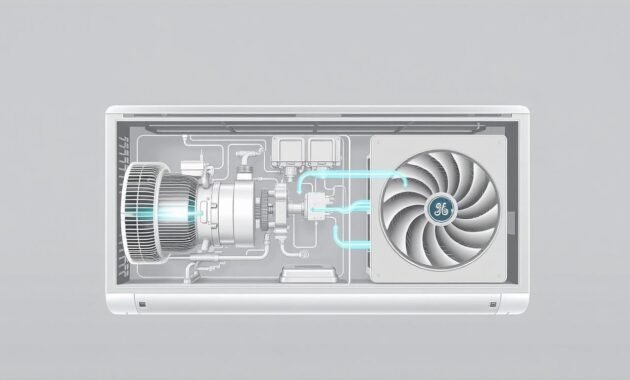
Here’s how your AC cools your space. It has several parts that work together:
- Compressor: The system’s power center that circulates refrigerant
- Evaporator coils: Where heat absorption happens
- Condenser coils: Where heat is released outside
- Refrigerant: The special fluid that transfers heat
GE ac compressor problems can hurt your unit’s efficiency. The compressor is like the heart, pumping refrigerant through the coils for heat exchange.
| Component | Function | Maintenance Importance |
|---|---|---|
| Compressor | Circulates refrigerant | High – critical for cooling performance |
| Evaporator Coils | Absorbs indoor heat | Medium – requires regular cleaning |
| Condenser Coils | Releases heat outside | Medium – needs periodic inspection |
Knowing these parts helps you spot and fix issues. Regular maintenance can prevent big problems and make your GE air conditioner last longer.
Checking and Cleaning Air Filters
Keeping your GE window unit cool is often simple. Just remember to clean the air filters. As an HVAC expert, I’ve seen many problems caused by dirty filters. Clean filters are key to your air conditioner’s performance.
Regular maintenance means knowing how to care for your filter. Dirty filters block airflow, lower cooling, and make your system work too hard.
How to Locate the Filter
Finding your GE air conditioner’s filter is easy:
- Check the front panel of your window unit
- Look for a removable grill or cover
- Consult your owner’s manual for specific model instructions
Proper Filter Maintenance Schedule
Follow a regular cleaning schedule for your air conditioner:
- Clean filters every 30 days during active use
- Remove filter carefully
- Rinse with warm water
- Allow filter to dry completely before reinstalling
Signs of a Dirty Filter
Look out for these signs that your filter needs cleaning:
- Reduced cooling performance
- Increased energy consumption
- Visible dust and debris accumulation
- Musty or stale odors from the unit
By spending a few minutes on regular filter maintenance, you can boost your GE window unit’s cooling. Plus, it will last longer.
Coil Maintenance and Ice Build-up Issues
Keeping your GE air conditioner’s coils clean is key for it to work well. Dirty or frozen coils can make your AC not cool properly. This can lead to your GE AC not blowing cold air.
Let’s go over how to keep your AC coils in great shape. Here are some important maintenance tips:
- Check outdoor and indoor coils often for dirt and debris
- Clean them gently with a soft-bristled brush or vacuum
- Look for ice, which can form when it’s cold outside
- Make sure there’s good airflow around the outdoor unit
Ice on your AC coils is a big problem. It usually happens when:
- The refrigerant level is too low
- Airflow is blocked
- It’s unexpectedly cool outside
| Coil Condition | Potential Issues | Recommended Action |
|---|---|---|
| Dirty Coils | Less cooling power | Clean with a soft brush |
| Iced Coils | Can’t cool at all | Thaw and check refrigerant |
| Blocked Coils | Airflow is cut off | Clear debris, check filters |
When fixing your GE air conditioner, always turn off the power first. If you’re not sure about cleaning coils or see a lot of ice, call a pro HVAC tech. They can find and fix more serious problems.
Proper Temperature Settings and Thermostat Operation
Learning how to set your GE air conditioner’s temperature is key for cool comfort and saving energy. Whether it’s a window or portable unit, knowing how to use your thermostat is important. It can really help with your comfort and lower your electricity bills.
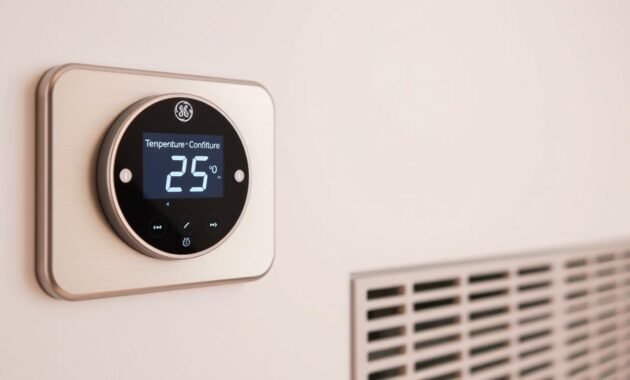
When you’re dealing with ge window ac troubleshooting, starting with temperature control is a good first step. Each GE air conditioner model has its own way of handling temperature settings.
Read also: Freon for Portable Air Conditioners
Optimal Temperature Range
Finding the perfect temperature can be hard. I suggest keeping your air conditioner between 72-78 degrees Fahrenheit. This range is great for comfort and saving energy. It keeps your space cool and your energy costs low.
- Daytime setting: 76-78 degrees
- Nighttime setting: 72-74 degrees
- Away from home: 80-82 degrees
Digital vs. Mechanical Controls
| Control Type | Pros | Cons |
|---|---|---|
| Mechanical Controls | Simple to use | Less precise temperature management |
| Digital Controls | Precise temperature settings | More complex interface |
Smart Temperature Management
Modern GE air conditioners have smart features for better temperature control. With these smart controls, you can:
- Program temperature schedules
- Monitor energy consumption
- Adjust settings remotely
By using these temperature control tips, you can manage your GE air conditioner well. This helps avoid common cooling issues.
Environmental Factors Affecting AC Performance
When your GE air conditioner isn’t cooling right, things outside can matter a lot. Knowing what affects it helps you get the most out of your window unit.
Temperature is key when your GE window unit doesn’t cool well. Most air conditioners have trouble when it’s too cold outside. The compressor needs the right conditions to work best:
- Indoor temperature must be above 64 degrees Fahrenheit
- Outdoor temperature should ideally be above 70 degrees
- Extreme temperature changes can hurt cooling
Humidity also affects how well your GE air conditioner cools. High humidity makes rooms feel warmer. This makes your AC work harder. Also, direct sunlight can raise indoor temperatures, making your unit less efficient.
How your room is set up and insulated matters too. Rooms with bad insulation, many windows, or appliances that heat up can be tough for your GE window unit. Placing it right and sealing it well can really help.
Knowing about these environmental factors helps you make your GE air conditioner work better. This way, you can keep your living space cool and comfortable all the time.
GE Air Conditioner Compressor Problems
The compressor is key to your air conditioning system. It circulates refrigerant and makes cool air. When it has problems, your unit’s performance and comfort suffer.
Knowing the signs of compressor issues can help you fix problems early. This can save you from expensive repairs.
Common Compressor Warning Signs
- Unusual loud clicking or buzzing noises
- Frequent system cycling on and off
- Reduced cooling performance
- Tripped circuit breakers
- Complete system shutdown
Identifying Critical Compressor Problems
Some compressor issues need quick professional help. If you see these symptoms, call a certified HVAC technician:
- Electrical failures preventing startup
- Refrigerant leaks
- Mechanical wear causing grinding sounds
- Persistent overheating
Essential Maintenance Tips
Regular maintenance can make your compressor last longer and avoid costly repairs. Here are some tips:
- Clean or replace air filters monthly
- Keep outdoor unit clear of debris
- Schedule annual professional inspections
- Maintain consistent thermostat settings
- Check refrigerant levels regularly
By taking care of your GE air conditioner, you can avoid compressor problems. This ensures cool air all summer long.
Troubleshooting Refrigerant Leaks and System Issues
Is your GE air conditioner not cooling well? A refrigerant leak might be the problem. Finding and fixing leaks early can prevent expensive repairs and keep your home cool.
I’ll guide you on spotting refrigerant problems in your GE air conditioner. Look out for these signs:
- Reduced cooling performance
- Unusual hissing sounds near the unit
- Ice formation on refrigerant lines or evaporator coils
- Increased energy consumption
Fixing refrigerant leaks needs careful handling during ge air conditioner repair. While some might try to fix it themselves, it’s best to call a pro.
| Symptom | Potential Cause | Recommended Action |
|---|---|---|
| Weak airflow | Refrigerant leak | Professional inspection |
| Ice on coils | Low refrigerant levels | Immediate service call |
| Warm air output | System refrigerant depletion | Certified technician repair |
If you think there’s a refrigerant leak, don’t try to fix it yourself. HVAC experts have the right tools to find and fix leaks in your GE air conditioner.
Conclusion
Exploring GE air conditioner troubleshooting has taught me a lot. Effective cooling isn’t just about fixing problems. It’s also about preventing them. GE air conditioner maintenance is key to keeping your unit running well.
We’ve looked at many ways to tackle cooling issues. From checking air filters to understanding system parts, GE window AC troubleshooting needs care and attention. Regular maintenance helps catch problems early, saving you from expensive repairs.
Some issues you can fix yourself, but others need a pro. If you’re unsure, call a certified HVAC technician. Keeping your air conditioner in good shape means better cooling and a longer unit life.
Knowing what your air conditioner needs is essential for cool summers. Stay ahead, stay cool, and trust in your ability to maintain your GE air conditioner.
